
Constitutional Theocracy
At the intersection of two sweeping global trends – the rise of popular support for principles of theocratic governance, and the spread of constitutionalism and judicial review – a new legal order has emerged: constitutional theocracy. It enshrines religion and its interlocutors as “a” or “the” source of legislation, and at the same time adheres to core ideals and practices of modern constitutionalism. A unique hybrid of apparently conflicting worldviews, values, and interests, constitutional theocracies thus offer an ideal setting—a “living laboratory” as it were—for studying constitutional law as a form of politics by other means. In this book, Ran Hirschl combines insights from legal theory, economics, theology, and political sociology with a rigorous comparative analysis of religion-and-state jurisprudence from dozens of countries worldwide to explore the evolving role of constitutional law and courts in a non-secularist world.
Counter-intuitively, Hirschl argues that the constitutional enshrinement of religion is a rational, prudent strategy that allows opponents of theocratic governance to talk the religious talk without walking most of what they regard as theocracy’s unappealing, costly walk. Many of the jurisdictional, enforcement, and cooptation advantages that gave religious legal regimes an edge in the pre-modern era, are now aiding the modern state and its laws in its effort to contain religion. The “constitutional” in a constitutional theocracy thus fulfils the same restricting function it carries out in a constitutional democracy: it brings theocratic governance under check, and assigns to constitutional law and courts the task of a bulwark against the threat of radical religion.
Constitutional Theocracy further demonstrates that precisely because the canonical constitutional scripture has certain religion-like aspects to it, it may be better positioned than blunter, more forceful means, to effectively control and pacify principles of theocratic governance. In that respect, Hirschl argues, constitutionalism might very well emerge, or perhaps has already emerged as tomorrow’s “opiate of the masses”.
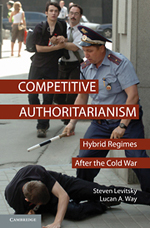
Competitive Authoritarianism: Hybrid Regimes After the Cold War
Competitive authoritarian regimes – in which autocrats submit to meaningful multiparty elections but engage in serious democratic abuse – proliferated in the post–Cold War era. Based on a detailed study of 35 cases in Africa, Asia, Latin America, and post-communist Eurasia, this book explores the fate of competitive authoritarian regimes between 1990 and 2008. It finds that where social, economic, and technocratic ties to the West were extensive, as in Eastern Europe and the Americas, the external cost of abuse led incumbents to cede power rather than crack down, which led to democratization. Where ties to the West were limited, external democratizing pressure was weaker and countries rarely democratized. In these cases, regime outcomes hinged on the character of state and ruling party organizations. Where incumbents possessed developed and cohesive coercive party structures, they could thwart opposition challenges, and competitive authoritarian regimes survived; where incumbents lacked such organizational tools, regimes were unstable but rarely democratized.
Part I. Introduction and Theory: 1. Introduction; 2. Explaining competitive authoritarian regime trajectories: international linkage and the organizational power of incumbents;
Part II. High Linkage and Democratization: Eastern Europe and the Americas: 3. Linkage, leverage, and democratization in Eastern Europe; 4. Linkage, leverage, and democratization in Latin America and the Caribbean;
Part III. The Dynamics of Competitive Authoritarianism in Low Linkage Regions: The Former Soviet Union, Africa, and Asia: 5. The evolution of post-Soviet competitive authoritarianism; 6. Africa: transitions without democratization; 7. Diverging outcomes in Asia; 8. Conclusion;
Appendix. Measuring competitive authoritarianism and authoritarian stability.
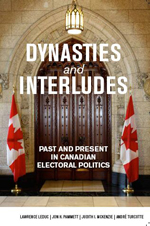
Dynasties and Interludes: Past and Present in Canadian Electoral Politics
Dynasties and Interludes provides a comprehensive and unique overview of elections and voting in Canada from Confederation to the recent spate of minority governments. Its principal argument is that the Canadian political landscape has consisted of long periods of hegemony of a single party and/or leader (dynasties), punctuated by short, sharp disruptions brought about by the sudden rise of new parties, leaders, or social movements (interludes). Changes in the composition of the electorate and in the technology and professionalization of election campaigns are also examined in this book, both to provide a better understanding of key turning points in Canadian history and a deeper interpretation of present-day electoral politics.
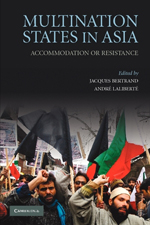
Multination States in Asia: Accommodation or Resistance
As countries in Asia try to create unified polities, many face challenges from minority groups within their own borders seeking independence. This volume brings together international experts on countries in all regions of Asia to debate how differently they have responded to this problem. Why have some Asian countries, for example, clamped down on their national minorities in favour of homogeneity, whereas others have been willing to accommodate statehood or at least some form of political autonomy? Together they suggest broad patterns and explanatory factors that are rooted in the domestic arena, including state structure and regime type, as well as historical trajectories. In particular, they find that the paths to independence, as well as the cultural elements that have been selected to define post-colonial identities, have decisively influenced state strategies.

Civil Religion: A Dialogue in the History of Political Philosophy
Civil Religion offers philosophical commentaries on more than twenty thinkers stretching from the sixteenth to the twentieth century. The book examines four important traditions within the history of modern political philosophy and delves into how each of them addresses the problem of religion. Two of these traditions pursue projects of domesticating religion. The civil religion tradition, principally defined by Machiavelli, Hobbes, and Rousseau, seeks to domesticate religion by putting it solidly in the service of politics. The liberal tradition pursues an alternative strategy of domestication by seeking to put as much distance as possible between religion and politics. Modern theocracy is a militant reaction against liberalism, and it reverses the relationship of subordination asserted by civil religion: it puts politics directly in the service of religion. Finally, a fourth tradition is defined by Nietzsche and Heidegger. Aspects of their thought are not just modern, but hyper-modern, yet they manifest an often-hysterical reaction against liberalism that is fundamentally shared with the theocratic tradition. Together, these four traditions compose a vital dialogue that carries us to the heart of political philosophy itself.

Immigrants and the Right to Stay
The Obama administration promises to take on comprehensive immigration reform in 2010, setting policymakers to work on legislation that might give the approximately eleven million undocumented immigrants currently living in the United States a path to legalization of status. Commentators have been quick to observe that any such proposal will face intense opposition.
Few issues have so divided the country in recent years as immigration. Immigrants and the Right to Stay brings the debate into the realm of public reason. Political theorist Joseph Carens argues that although states have a right to control their borders, the right to deport those who violate immigration laws is not absolute. With time, immigrants develop a moral claim to stay. Emphasizing the moral importance of social membership, and drawing on principles widely recognized in liberal democracies, Carens calls for a rolling amnesty that gives unauthorized migrants a path to regularize their status once they have been settled for a significant period of time.
After Carens makes his case, six experts from across the political spectrum respond. Some protest that he goes too far; others say he does not go far enough in protecting the rights of migrants. Several raise competing moral claims and others help us understand how the immigration problem became so large. Carens agrees that no moral claim is absolute, and that, on any complex public issue, principled debate involves weighing competing concerns. But for him the balance falls clearly on the side of amnesty.
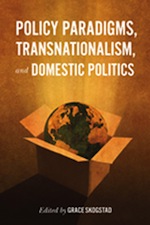
Policy Paradigms, Transnationalism, and Domestic Politics
Policy Paradigms, Transnationalism, and Domestic Politics offers a variety of perspectives on the development of policy paradigms — the ideas that structure thinking about what can and should be done in a policy domain. In this collection, international experts examine how both transnational actors and domestic politics affect the structuring of these paradigms.
As well as theoretical chapters, this volume includes six case studies showing ideas at work in a diverse range of policy domains from the recognition of same-sex unions to risk regulation of genetically modified organisms. These qualitative analyses show how transnational activities shape policy paradigms by building consensus on ideas about feasible and desirable public policies across authoritative decision-makers. Expertly researched and assembled, Policy Paradigms, Transnationalism, and Domestic Politics provides insight into the conditions under which different transnational actors can bring about changes in the core ideas that affect public policy development.
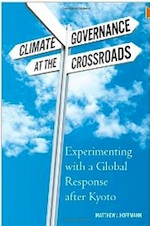
Climate Governance at the Crossroads Experimenting with a Global Response after Kyoto
The global response to climate change has reached a critical juncture. Since the 1992 signing of the United Nations Framework Convention on Climate Change, the nations of the world have attempted to address climate change through large-scale multilateral treaty-making. These efforts have been heroic, but disappointing. As evidence for the quickening pace of climate change mounts, the treaty-making process has sputtered, and many are now skeptical about the prospect of an effective global response. Yet global treaty-making is not the only way that climate change can be addressed or, indeed, is being addressed.
In the last decade myriad initiatives have emerged across the globe independently from, or only loosely connected to, the “official” UN-sponsored negotiations and treaties. In the face of stalemate in the formal negotiations, the world is experimenting with alternate means of responding to climate change. Climate Governance at the Crossroads chronicles these innovations–how cities, provinces and states, citizen groups, and corporations around the globe are addressing the causes and symptoms of global warming. The center of gravity in the global response to climate change is shifting from the multilateral treaty-making process to the diverse activities found beyond the negotiating halls. These innovations are pushing the envelope of climate action and demonstrating what is possible, and they provide hope that the world will respond effectively to the climate crisis.
In introducing climate governance “experiments” and examining the development and functioning of this new world of climate policy-making, this book provides an exciting new perspective on the politics of climate change and the means to understand and influence how the global response to climate change will unfold in the coming years.

The Encyclopedia of Political Science
Political science needs a resource that serves as a core reference to the central ideas, concepts, and frameworks underlying the study of politics and that highlights the intersections of politics with other disciplines. The Encyclopedia of Political Science (TEPS) is designed to fill that need. It is the encyclopedia for political science in the twenty-first century.
Prepared with the assistance of the American Political Science Association (APSA), TEPS brings together a distinguished editorial board and over 600 distinguished and rising scholars to chronicle and assess the core issues that have long concerned students of politics. This comprehensive, multi-volume work traces the evolution of political theories, concepts, research frameworks, and political practices from across the world. As it examines the interplay of political ideas and processes, the encyclopedia also conveys the vitality and excitement of politics in practice.
Cognizant of the global nature of political ideas and movements, TEPS reflects a wide range of concepts and frameworks, both Western and non-Western, national and international. An authoritative survey of the state of politics and political science, this five- volume work consists of more than 1,500 A to Z signed entries by contributors from over 30 countries, including 300 overview articles or interpretive essays.
The encyclopedia supports all of the core undergraduate courses in political science: American government, comparative politics, international relations, public policy, public administration, political behavior, political theory, and political science methods. It will be an essential reference for all academic and public libraries.

Political Theories of Decolonization Postcolonialism and the Problem of Foundations
Political Theories of Decolonization provides an introduction to some of the seminal texts of postcolonial political theory. The difficulty of founding a new regime is an important theme in political theory, and the intellectual history of decolonization provides a rich–albeit overlooked–opportunity to explore it.
Many theorists have pointed out that the colonized subject was a divided subject. This book argues that the postcolonial state was a divided state. While postcolonial states were created through the struggle for independence, they drew on both colonial institutions and reinvented pre-colonial traditions. Political Theories of Decolonizationilluminates how many of the central themes of political theory such as land, religion, freedom, law, and sovereignty are imaginatively explored by postcolonial thinkers. In doing so, it provides readers access to texts that add to our understanding of contemporary political life and global political dynamics.